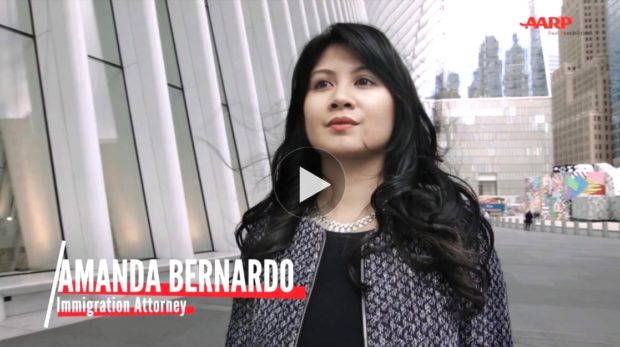Older Fil-Ams are vulnerable targets of immigration scams — AARP

AARP presents “Immigration Fraud Prevention,” a nationwide public service announcement produced by NextDayBetter in collaboration with the Asian American Bar Association of New York, the Filipino American Lawyers Association of New York, and the Asian American Bar Association of New York. CONTRIBUTED
NEW YORK — Older Filipino Americans are particularly vulnerable as targets of immigration fraud.
According to AARP’s “Facing Fraud or Saving Face? A Survey of Asian Americans and Pacific Islanders 50 Years and Older on Fraud and Scams,” many con artists use immigration scams to falsely promise cheap, quick, or easy paths to work permits and green cards.
Scammers pretend to provide quality legal advice, help with paperwork, or other tasks involved in the immigration process. The scammer usually asks for an upfront fee, takes the money, and disappears immediately. Or worse, they provide ineffective or even harmful representation by filing the wrong paperwork, using fraudulent measures, or misrepresenting facts.
The American Bar Association believes immigration fraud is underreported because many victims are often ashamed to report it to authorities or are afraid it will affect their immigration status.
“The immigration process can be confusing and intimidating, especially for Filipinos and Asian immigrants who face language barriers,” says attorney Amanda Bernardo, Board Member at the Filipino American Bar Association of New York and Co-Chair of the Immigration Committee at the Asian American Bar Association of New York.
“You need to carefully vet the right immigration attorney, who can lend the right immigration services based on their client’s complex immigration needs,” Bernardo adds.
Some tips on how to protect yourself from immigration fraud include:
- Work only with people who are authorized by the government to help you.
- Real government website URLs should have .gov domains.
- Always verify the person’s credentials. You should call the appropriate government agency and confirm that whoever has contacted you is a legitimate representative.
- Don’t let anyone keep your original documents, like your birth certificate or passport.
- Never pay for blank government forms or sign a form that either isn’t filled out yet or that you don’t understand.
- Keep a copy of every form you submit and every letter from the government for your own records.
- Avoid notary publics for legal advice. They are not licensed lawyers and cannot talk to government agencies on your behalf.
“Con artists often target immigrant communities because they are particularly vulnerable, but knowing how they work can help you spot and avoid scams,” said Daphne Kwok, AARP Vice President of Multicultural Leadership, Asian American and Pacific Islander Audience Strategy. “The focus of our fraud initiative is to provide the community tools needed to outsmart con artists before they strike.”
For more information, visit aarp.org/fraudwatchnetwork or ftc.gov/immigration.

